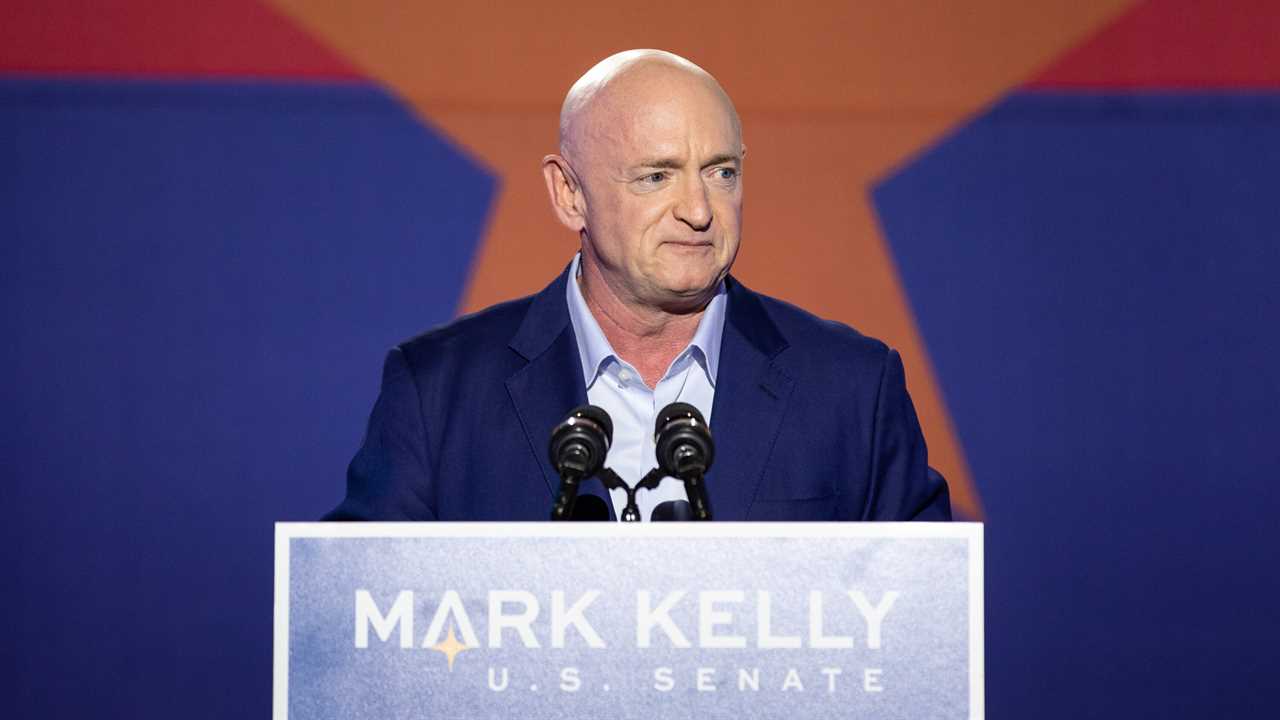
WASHINGTON — Senator Mark Kelly is no stranger to lonely missions.
As a former astronaut, he traveled millions of miles in space piloting shuttles to the International Space Station on four different missions, one of them just months after an assassination attempt nearly claimed the life of his wife, former Congresswoman Gabrielle Giffords. The circumstances of that trip captivated the nation and brought President Barack Obama out to the launch.
On Wednesday, he began another kind of lonely journey, becoming the first of a new class to be formally sworn into the Senate and one of just two Democrats who succeeded this year in unseating a Republican incumbent. His arrival whittled Senate Republicans’ narrow majority to 52-48, a distinction for Mr. Kelly that adds to the outsize profile he will wield as a freshman senator.
Mr. Kelly’s arrival all but dooms the already fraught nomination of Judy Shelton, President Trump’s nominee to the Federal Reserve’s Board of Governors, whom the administration had hoped to confirm before the end of the lame-duck session. And it further narrows the margins for any other appointee the Senate may consider in the final weeks of Mr. Trump’s presidency.
It was also the beginning of what will be an unusually short term for Mr. Kelly, with a return to the campaign trail on the horizon. Last month, he won a special election to serve out the remainder of the late Senator John McCain’s term, and will have to face voters again in 2022.
“He is a national figure,” said Kim Fridkin, a professor of political science at Arizona State University. “It is likely he won’t just be a backbencher.”
His victory in one of the most expensive and closely watched races in the nation was the first time since the 1950s that Arizonans had chosen two Democrats simultaneously to represent them in the Senate, underscoring the shifting demographics and politics of a state once known as a conservative stronghold. And it was an isolated bright spot for Senate Democrats, whose losses on Election Day dashed their hopes that Mr. Kelly would be joined next year by a crop of newly elected Democrats who had unseated Republican incumbents in states like Maine and North Carolina.
A retired U.S. Navy captain who flew combat missions during the Persian Gulf war, Mr. Kelly rose to prominence as a space shuttle pilot with NASA, leading missions to the International Space Station, where for a brief time he had a recurrent gig introducing U2 before their concerts. But he was thrust into a national spotlight under tragic circumstances, when Ms. Giffords was shot in the head in a politically motivated attack that killed six and wounded 12 others.
“The shooting changed both of our lives — dramatically, negatively and permanently,” Mr. Kelly said at his campaign launch. “Like so many families, we were knocked to the ground in a drastic and unexpected way. But we got up.”
After retiring from NASA, Mr. Kelly and Ms. Giffords set to work establishing a vast political network dedicated to preventing gun violence, sending millions of dollars a year to political candidates — many of whom now serve in Congress — who support changes in gun laws.
In Arizona, Mr. Kelly found the wind at his back, facing a weakened candidate in Republican Senator Martha McSally, and a rapidly changing state where women, younger voters and Latinos had become increasingly powerful parts of the electorate. Ms. McSally lost a Senate bid in 2018 after tying herself to President Trump, only to be appointed to a different seat and stick to the same playbook in 2020.
On the campaign trail, Mr. Kelly leaned hard into his biography as a former Navy captain and astronaut, adopting the mantra “full speed ahead.” He had a compelling surrogate in Ms. Giffords, who spoke in personal terms about his commitment to both his country and to her, gesturing in an advertisement to how he had “helped me through my darkest moments.”
Mr. Kelly quickly emerged as a fund-raising juggernaut, shattering records in state and nationally by tapping his own network and building a list of small dollar donors who were energized by Mr. Kelly’s dynamic biography and determined to wrest control of the Senate away from Republicans.
“As Mark likes to say, his wife Gabby was already the member of the family in Congress, but tragedy upended both their lives and changed so many of their plans,” Senator Chuck Schumer of New York, the minority leader, said Wednesday. “Everyone continues to be inspired by Gabby’s recovery, by Mark’s devotion, and the courage it took for their family to re-enter public life and public service.”
As a candidate, Mr. Kelly cut a largely cautious figure, pointedly staying away from issues tinged with controversy and keeping a laserlike focus on promoting bipartisanship and health care reform. He spoke openly and often about his admiration for Mr. McCain, a fellow naval aviator, citing the widely respected Arizonan as the blueprint for the type of lawmaker he would like to become.
He will work out of Mr. McCain’s old office, and on Tuesday, the day before being sworn in, Mr. Kelly and his family visited the senator’s grave at the U.S. Naval Academy Cemetery in Annapolis.
“It’s not often that we get to meet our heroes, and even less often that we get to call them a friend,” Mr. Kelly said in his victory speech. “I got to do that with Senator McCain.”
Whether he is fully emboldened to adopt Mr. McCain’s pugnacious brand, however, is another matter. Facing yet another expensive and competitive campaign in 2022, Mr. Kelly is seen as unlikely to take major political risks as a new senator.
“He ran a very safe campaign and I think he’s going to be a pretty safe senator,” Ms. Fridkin said. “But I do think he’s going to try to follow up McCain’s willingness to not toe the party line.”
Did you miss our previous article...
https://trendinginthenews.com/usa-politics/biden-and-his-economic-team-urge-quick-action-on-stimulus-as-risks-mount






